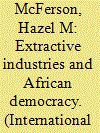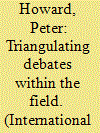|
|
|
Sort Order |
|
|
|
Items / Page
|
|
|
|
|
|
|
| Srl | Item |
| 1 |
ID:
100198


|
|
|
|
|
| Publication |
2010.
|
| Summary/Abstract |
As the color revolutions have stalled and the challenge to democracy by authoritarianism has increased, it is essential to explore the potential of a new ``reverse wave'' which may create a greater balance between liberalism and autocracy. This article seeks to begin this process by outlining a framework of authoritarian diffusion. Two key diffusion dynamics are outlined: appropriateness, the impact of changes in the relative normative power of democracy/autocracy, and effectiveness, how the successes of authoritarian countries increase the chances that others will see them as role models. A number of contributing factors are also identified, which make these processes more or less likely. These include: geography, linkage, international organizations, great power prestige, and reference groups. If we are to understand the future strength of authoritarianism as a global or regional phenomenon, which affects, reinforces, and aggravates domestic conditions, then a new theoretical framework is necessary.
|
|
|
|
|
|
|
|
|
|
|
|
|
|
|
|
| 2 |
ID:
100196


|
|
|
|
|
| Publication |
2010.
|
| Summary/Abstract |
y the well-known "resource curse," the abundance of oil and other valuable minerals has been associated with patrimonialism and repression-in Africa and elsewhere. This article demonstrates a self-sustaining dynamic: lack of accountability enables elite appropriation of resources which in turn raises the monetary value of political control and finances continued repression. Several initiatives have been taken in recent years to foster transparency in mineral production and revenue, but with marginal impact. Lifting the curse requires a robust global effort to discourage "plunder oil." This is unlikely as long as the benefits of cheap oil to the importing countries outweigh the costs to the population of the exporting countries. The oil addiction of developed and emerging economies remains an oil malediction for African democracy. But launching a sustained international debate could eventually bear fruit.
|
|
|
|
|
|
|
|
|
|
|
|
|
|
|
|
| 3 |
ID:
100195


|
|
|
|
|
| Publication |
2010.
|
| Summary/Abstract |
We analyze whether international criminal tribunals and domestic human rights trials can play an important role in peacebuilding in post-conflict societies. Advocates and scholars argue that by providing justice and truth, helping to remove war criminals and peace spoilers from their societies, and by contributing to deterrence, these institutions contribute to improvements in human rights and the maintenance of peace. Other scholars assert that few such beneficial effects have occurred. We test the impact of international tribunals and domestic trials on the recurrence of civil war and human rights improvements in states that have emerged from civil war since 1982. The evidence regarding their beneficial impacts is fairly clear, however, and suggests that while domestic human rights trials and international tribunals do not exercise any negative effects, they do not appear to contribute to reducing the recurrence of civil war or improvements in human rights practices.
|
|
|
|
|
|
|
|
|
|
|
|
|
|
|
|
| 4 |
ID:
100197


|
|
|
|
|
| Publication |
2010.
|
| Summary/Abstract |
International relations scholars generally argue that norm-building requires a number of successful cases. This essay, however, is about three concrete examples when virtually everyone-except for the state citing it-disputes the legitimacy of applying the emerging norm of the responsibility-to-protect (R2P). Misrepresentations of humanitarian intentions can be disingenuous and geopolitically driven, as was the case for the US and UK war in Iraq and the Russian claim to protect South Ossetians, or disinterested but wrong, as was the French invocation of R2P for Burma. These cases suggest that misuses can advance norms through contestation and conceptual clarification. Because contestation prompts debates, denial, and tactical concessions on the norm in question, it is insightful to compare and contrast R2P's development against the early stages of two theoretical models that deal most explicitly with contestation: the "spiral" of human rights change and the "cascade" of norm development.
|
|
|
|
|
|
|
|
|
|
|
|
|
|
|
|
| 5 |
ID:
100199


|
|
|
|
|
| Publication |
2010.
|
| Summary/Abstract |
Undergraduate introductory methods courses offer a unique opportunity to bring methodological pluralism to the field by teaching students multiple approaches to research. This article presents one way to organize an introductory undergraduate research methods course. By focusing on central debates between methodological approaches on issues of causality, context, and essentialism, an instructor can introduce positivism, interpretivism, and relationalism as distinct, coherent methodological approaches to research. Depicting these three debates and three approaches graphically on a triangle can illuminate some core methodological debates within the field today. It also illuminates the methodological underpinnings of many of the discipline's theoretical debates.
|
|
|
|
|
|
|
|
|
|
|
|
|
|
|
|
|
|
|
|
|